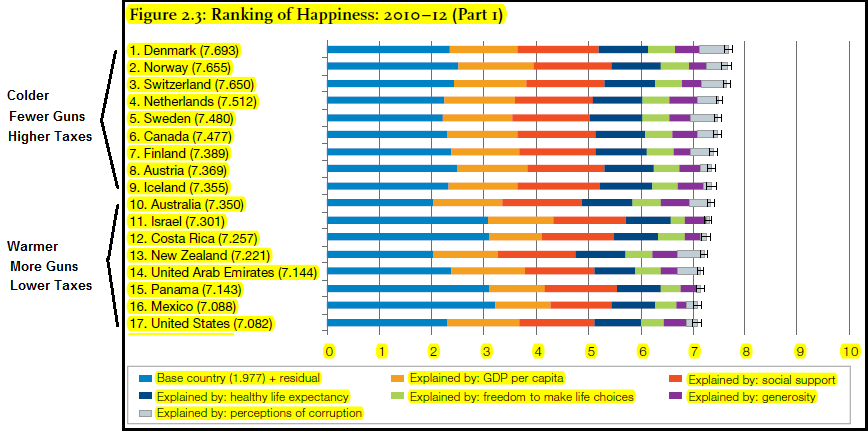How many people do you think are really, truly, happy? And does this have anything to do with where you grew up or currently reside?
The United Nations passed a resolution in 2011 that looked into the Gross National Happiness (GNH) of different countries. The idea here is that this knowledge will help policy makers decide how they can improve their country or what they need to work on. But it's more than that.
This data further shows what our societies really need, regardless of what we want. Many in our society have aspirations to become wealthy, loved, and respected. These things are desirable because they are thought to correlate with happiness. As happiness is hard to quantify, no one really knows how to get there. You cannot ask for directions, you just have to do your best.
From that another important question arises: how do you measure GNH?
This graph below shows seven different criteria that were deemed important in contributing to the happiness of a nation, from GDP to generosity. Each one is likely to contribute to happiness, so the country with the most all together would be the happiest place to live.

Source: World Happiness Report 2013
The diagram goes further to point out similarities between the top half and bottom half of the list. Apparently a country is more likely to be happy if it is cold, has less guns, and higher taxes . The cold is likely a spurious relationship (what effect would weather have) but less guns would likely mean less violence (and therefor less fear and stress). However, I think the difference in taxes is the most important factor because of the implications carried with taxes. Higher taxes are usually different between socioeconomic strata, which means that the wealthier are taxed more. This decreases the wealth gap and helps those who cannot fully support themselves. It also prevents the wealthy from getting self-obsessed and greedy about their money.
A parallel problem with low taxes is the individualist culture that usually accompanies it. For example, in the United States we are taught that we have to work for everything we have, and in that way we earn it -- fair and square. Right? Wrong. Not everyone has the same opportunities or outcomes even if they work just as hard as their peers. The belief that the homeless are just lazy or gave up is ignorant to the inherent inequality in our societies; we should be compassionate and helpful instead of snobby and self-important.
The top few countries on the happiness scale are overwhelmingly Scandinavian. These societies have fantastic welfare systems that aid those in need. It also leads to a culture of helping out your neighbor, instead of screwing him over for your own personal gains. If we worked for our community instead of ourselves, where would the United States be on that list today?
It's a bit disappointing, albeit unsurprising, that the United States ranked the lowest for Gross National Happiness. I agree with your point about our individualist culture negatively affecting our country's collective happiness; it seems that when we are so caught up with bolstering our own health, wealth, and general prosperity that we forget the holistic benefits of community. Of course happiness also depends on differences in our economic, political, and educational institutions, but I think the individualist culture is the main culprit for our relative lack of happiness. The small percentage of the US population who is "prosperous" controls the means to prosperity and allocate the best opportunities for those who rank highest in terms of wealth and social status. This creates an exponentially widening gap between the rich and poor in which seems that neither side is truly happy. The poor and working classes aren't happy for obvious reasons—they usually lack the income required to fulfill their family's basis needs. The rich don't seem to be particularly happy either, though many would agree they have a reason, perhaps even an obligation, to be happy by merit of their wealth. However, the accumulation of wealth usually develops into a sense of greed and insatiable entitlement, not happiness. When we start to champion collective good over individual prosperity, maybe our country will undergo a paradigm shift and ascend on the GNP scale.
ReplyDelete